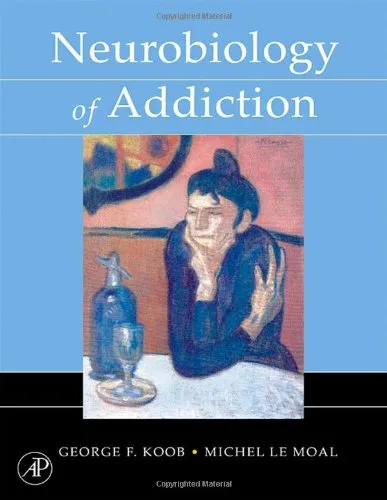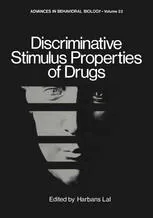Neurobiology of Addiction
4.5
بر اساس نظر کاربران

شما میتونید سوالاتتون در باره کتاب رو از هوش مصنوعیش بعد از ورود بپرسید
هر دانلود یا پرسش از هوش مصنوعی 2 امتیاز لازم دارد، برای بدست آوردن امتیاز رایگان، به صفحه ی راهنمای امتیازات سر بزنید و یک سری کار ارزشمند انجام بدینکتاب های مرتبط:
معرفی کتاب "Neurobiology of Addiction"
کتاب "Neurobiology of Addiction" تالیف جورج اف. کووب و میشل لو موال، یکی از برجستهترین منابع علمی در زمینه اعتیاد است. این کتاب با ترکیب مفاهیم علوم اعصاب، روانشناسی و زیستشناسی رفتاری سعی دارد تا تصویری جامع از اعتیاد بهعنوان یک بیماری مغزی ارائه دهد. مخاطبان این کتاب پژوهشگران، دانشجویان و علاقهمندان به علوم اعصاب و علوم رفتاری هستند که به دنبال درک عمیقتر از مکانیسمهای زیستی و رفتاری اعتیاد هستند.
خلاصهای جامع از کتاب
کتاب "Neurobiology of Addiction" در سه بخش اصلی نگاشته شده است. بخش اول به معرفی مکانیسمهای پایه سیستم پاداش مغز میپردازد. در این بخش، نویسندگان توضیح میدهند که چگونه مواد مخدر میتوانند سیستم پاداش طبیعی مغز را مختل کنند و رفتارهای اعتیادی را شکل دهند.
در بخش دوم، کتاب به تأثیرات طولانیمدت و سازگاریهای عصبی ناشی از مصرف مداوم مواد مخدر میپردازد. در این قسمت، مفاهیمی مانند tolerance، sensitization و neuroplasticity به صورت جامع مورد بحث قرار میگیرند. این بخش بهویژه برای فهم مکانیزمهای زیربنایی تغییرات رفتاری مرتبط با اعتیاد بسیار مفید است.
بخش پایانی تمرکز خود را بر روی درمان و پیشگیری از اعتیاد قرار میدهد. در این قسمت، نویسندگان به بررسی روشهای درمانی موجود و نیز مسیرهای تحقیقاتی آینده برای مدیریت اعتیاد پرداختهاند. از روشهای دارودرمانی گرفته تا روشهای رفتاری و تکنیکهای نوین مبتنی بر شناخت، همگی در این بخش تحلیل شدهاند.
نکات کلیدی کتاب
- اعتیاد بهعنوان یک بیماری مزمن مغزی تعریف شده است که همراه با اختلال در چرخه پاداش و کنترل تکانهها است.
- مواد مخدر مانند کوکائین، هروئین و الکل از مکانیسمهای مشابهی برای تغییر عملکرد عصبی استفاده میکنند.
- مفاهیمی مانند allostasis و stress بهطور گستردهای در توضیح مراحل پیشرفت اعتیاد بحث شدهاند.
- راهکارهای نوین برای درمان اعتیاد نیازمند ترکیب مداخلات دارویی و رفتاری است.
جملات معروف از کتاب
"Addiction fundamentally changes the brain, hijacking the very systems that keep us motivated and directed toward positive goals."
"Understanding addiction as a disorder of the brain is the key to developing effective treatments."
چرا این کتاب مهم است؟
در دنیای امروز، اعتیاد بهعنوان یکی از معضلات اجتماعی-بهداشتی اساسی شناخته میشود که نه تنها بر سلامت جسمی و روانی افراد تأثیر میگذارد، بلکه هزینههای مالی و اجتماعی سنگینی نیز دارد. کتاب "Neurobiology of Addiction" اهمیت ویژهای دارد زیرا:
- یک رویکرد علمی و مبتنی بر شواهد به پدیده اعتیاد ارائه میدهد.
- درک عمیقی از تغییرات زیستی و رفتاری مرتبط با اعتیاد فراهم میسازد.
- دانش را بهسمت ایجاد رویکردهای درمانی مؤثرتر هدایت میکند.
- برای متخصصین حوزه سلامت، دانشجویان و محققان، پایهای ارزشمند برای درک بهتر اعتیاد است.
کتاب "Neurobiology of Addiction" با ارائه رویکردی ترکیبی از علوم اعصاب و روانشناسی، نه تنها به بررسی مکانیسمهای زیستی درگیر در اعتیاد میپردازد، بلکه تأثیرات روانی و اجتماعی این پدیده را نیز در نظر میگیرد. این ویژگیها باعث میشود که این کتاب یکی از منابع ضروری برای مطالعه در زمینه اعتیاد باشد.
Introduction to the Neurobiology of Addiction
Addiction remains one of the most pressing challenges in society, a complex and multifaceted condition that affects individuals, families, and communities. "Neurobiology of Addiction", authored by George F. Koob and Michel Le Moal, delves into the intricate biological processes that underlie addictive behaviors. Combining decades of research in neuroscience, psychology, and medicine, the book provides an in-depth exploration of the mechanisms driving addiction, the effects on the brain, and the implications for treatment strategies. As a comprehensive scientific guide, this book highlights the intersection of biology and behavior, helping readers understand why addiction is not merely a failure of willpower but a disorder embedded in brain function.
Detailed Summary of the Book
"Neurobiology of Addiction" offers a detailed discussion of the key concepts, theories, and research related to substance use disorders and the biology of compulsive behavior. The book begins by explaining the basic principles of addiction as a brain disorder, emphasizing the role of neurocircuitry and the brain's reward systems. It explores how substances such as alcohol, nicotine, and opioids hijack these systems, leading to the characteristic cycle of bingeing, withdrawal, and craving.
Each chapter dives into a specific aspect of addiction. Topics covered include the role of neurotransmitters such as dopamine and glutamate, the impact of chronic substance use on brain plasticity, and the emotional and stress-related dimensions of addiction. The authors also pay significant attention to genetic and environmental factors, providing a holistic perspective on how addiction develops. Moving beyond theory, the book examines treatment approaches, from pharmacological therapy to behavioral interventions, and discusses the potential of emerging technologies to revolutionize addiction recovery.
Grounded in both basic and clinical sciences, "Neurobiology of Addiction" serves not only as a foundational resource for neuroscientists, healthcare professionals, and researchers but also as a valuable reference for anyone who seeks a deeper understanding of addiction as a condition rooted in human biology.
Key Takeaways
- Addiction is a brain disorder rather than a moral failing, driven by disruptions in specific neurocircuitry.
- The reward system, stress system, and executive functions in the brain play critical roles in the addiction cycle of bingeing, withdrawal, and craving.
- Chronic substance use causes physical and chemical changes to the brain, affecting its ability to regulate emotions, decision-making, and behavior.
- Genetic predispositions and environmental influences interact to shape an individual's vulnerability to addiction.
- Recovery requires treating both the biological components of addiction and addressing psychological, social, and environmental factors.
Famous Quotes from the Book
- "Addiction is not a choice; it is a disease of the brain that alters motivational hierarchies."
- "The hijacking of the brain's reward system is the cornerstone of addiction, creating a destructive cycle that is difficult to escape."
- "Understanding addiction as a multifaceted condition offers the best path toward effective treatment and eventual recovery."
- "The neurobiology of addiction reflects the dynamic interplay between our biology and the environments we inhabit."
Why This Book Matters
"Neurobiology of Addiction" is an essential resource for understanding addiction in the modern age. By bridging the gap between molecular neuroscience and human behavior, the book provides insights into the biological mechanisms that shape compulsive drug use. It paves the way for evidence-based treatment strategies and offers hope for better outcomes in addressing addiction. The book's multidisciplinary approach ensures that it is relevant to researchers, clinicians, policymakers, and educators—anyone invested in tackling the global epidemic of addiction.
Beyond its scientific contributions, the book challenges the stigma surrounding addiction by reframing it as a brain disorder rather than a moral or personal flaw. This shift in perception is critical to fostering both compassion and innovation in the field. Combining rigor, clarity, and a commitment to understanding the human experience, "Neurobiology of Addiction" is a must-read for anyone seeking to comprehend one of the most profound and far-reaching challenges of our time.
دانلود رایگان مستقیم
برای دانلود رایگان این کتاب و هزاران کتاب دیگه همین حالا عضو بشین
برای خواندن این کتاب باید نرم افزار PDF Reader را دانلود کنید Foxit Reader



